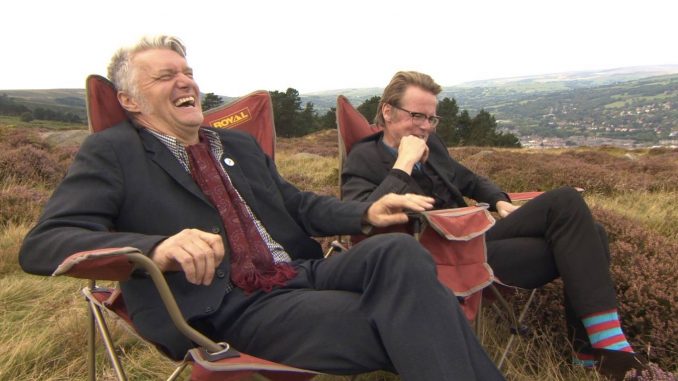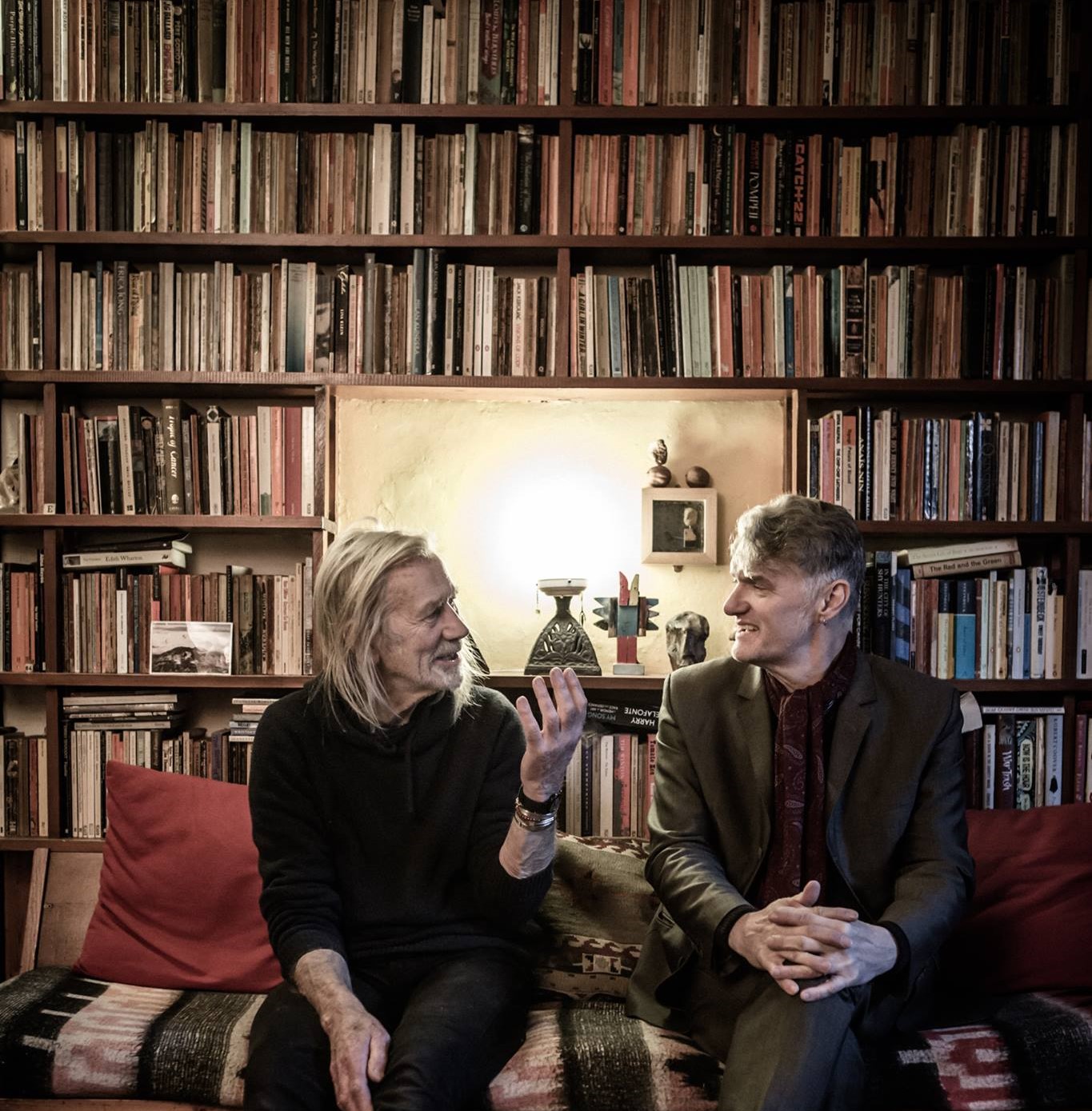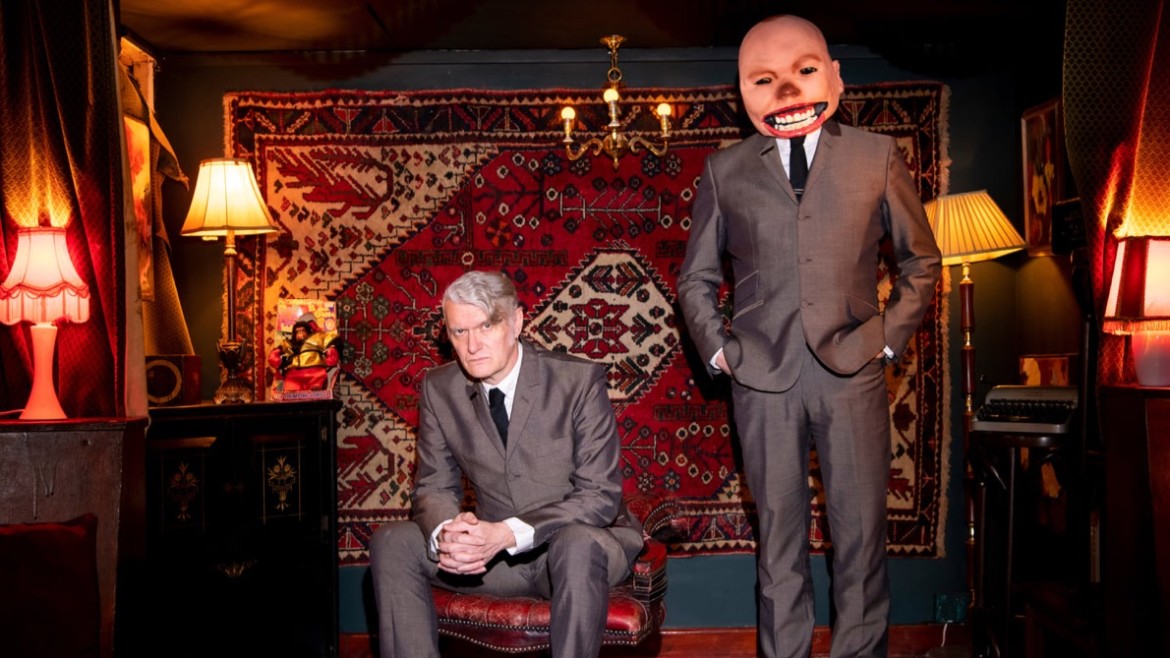
From revolutionary vanguard to washed up retired radical. Or is he? Dunstan Bruce reflects on his time with Chumbawamba, from bedsit anarchists, to chart topping pop stars, with ‘that song’.
In 1997 a song that, on the face of it, was just about getting drunk, ‘Tubthumping’ became a global mega-hit, throwing Chumawamba into the limelight. A future of TV chat shows, awards dinners and world tours lay ahead. Just what every band dreams of, eh? Well, maybe. The thing is, Chumbawama were no ordinary band. They had been around since 1982 and were graduates of the ‘anarcho-punk’ school of anti-capitalist, fuck-the-system, agit-pop. The music industry and media hated them – but now they were mega-selling popstars, so now purist punks and anarchists would accuse them of being sell outs. What a conundrum.
TUBTHUMPING VIDEO
Dunstan is now a very dapper middle-aged man that wanders around B-right-on in three-piece suits and brogues, towing a sausage dog along the promenade. He wonders where his future lies, but “in order to go forwards I need to know where I have been”, so he looks back at his past
He was brought up in Billingham, County Durham, which is not very cool. But he moved to the metropolis of Leeds, just as punk rock was changing the world.
I Get Knocked Down mixes contemporary interviews with former band mates and archive footage. They go back to visit the anarchist squat they lived in communally and reflect on the anti-Thatcher, pro-animal rights, anti-war politics of the time.
Crass were obviously an influence, but they also wanted to sound like the Beatles and change the world.
Not ones for conformity, they stayed clear of the punk template and made more accessible music ‘pop’, but still with witty and sharp lyrics to get that anarchist message over to an audience far wider than your average punk band would. They weren’t just preaching to the converted, but many anarchists did dig their groove.
Then they have a ‘happy accident’ and an accidental number one. With a record released on the dreaded EMI label, no less. Top of the Pops and the Letterman show follow. Bloody sell outs.
But hey, if you sneak ‘Free Mumia Abu-jamal’ into one of your songs on the Letterman show, you’re going to spread the word far wider than you would doing it in a squat in Barnsley. Likewise, ‘New Labour sold out the Liverpool Dockers’ reaches a wider audience if sung at The Brits.
All well and good, selling rebellion and still lining your pockets. But this is Chumbawamba. They had the balls to licence music for adverts for big companies, then give the proceeds to groups campaigning against those big companies.
The film features an interview with an executive from Republic Records who says that he would not have got involved with them had he known the trouble they would cause.
But for a while they invaded every aspect of culture, even Homer sang ‘Tubthumping’ on The Simpsons.
They end up on News at Ten and all over the tabloids, following ‘that incident’ at the Brit Awards. If you know, you know, if you don’t, watch the film! As a result, the paparazzi start hounding Danbert Nobacon’s parents, outing him as a ‘middle class soft boy called Nigel’.
In their early days, they were contemporaries of Crass, the groundbreaking outfit that launched a thousand anarcho-punks and no doubt radicalised a whole generation. Penny Rimbaud, now writer, but at the time drummer with Crass is interviewed and the film includes a bizare scene with Penny revealing all to dance naked. Penny discusses the issue of selling out, or not, and questions what exactly the ‘mainstream’ is. Crass were selling more records than Status Quo but the establishment never let them trouble the official charts. He was wary of Chumbawamba’s flirtation with the charts but gives them kudos for the Brit Awards thing. (I told you, if you don’t know, watch the film!)

Throughout the film the ‘baby head’ that appears on the cover of the Tubthumping album is in the background as Dunstan’s alter-ego, challenging Dunstan and keeping his feet on the ground. He takes the piss of the Rimbaud interview. “Ooooh, get you, an audience with the guru The Wonderful Wizard of Crass”.
Chumbawamba didn’t change the world, but they changed some people’s lives. They raised awareness, agitated and educated.
Many of the things that exercised the band in the eighties and nineties; war, racism, poverty, are still issues of concern now. Trump, Black Lives Matter. inequality etc. In the film we meet some young bands that have picked up the baton and are carrying on the mission to make the world a better place one song at a time.
Whilst Chumbawamba aren’t active as a band and shouting at the world anymore, some of them are still doing things, writing, art etc. Dunstan and Harry now have the band Interrobang and continue to want to change the world, they are ‘still angry after all these years’. They don’t want to give up caring.
The film was made in conjunction with film maker Sophie Robinson, who wasn’t really aware of what a phenomena Chumbawamba were. She was blown away by how warmly Dunstan was greeted by fans everywhere they went. Turns out he is quite famous.
Dunstan has made it clear that this is his version of events, other members of the band may have different memories, but lots of them participate and it is certainly not ‘all about me’.
All in all, its very entertaining and the presence of Baby Head character questioning the validity of every action is a nice touch that ensures no one’s ego runs away with them.
It runs through the history of the band, but at the same time is constantly reflecting on the concept of ‘selling out’.
The trouble with principles is that the more of them you have, the more you are judged and the further you have to fall should you stray away from them. Nobody questioned Oasis’ principles or accused them of selling out, because they didn’t have any principles. Not only did Chumbawamba have principles, those principles were their raison d’etre. They made The Clash look like a bunch of Tories. When you are that righteous, you will get grief for not weaving your own cloth to make your clothes, not brewing your own beer or not building your own vegetable oil powered van to drive off road to get to the next village and perform in a tipi.
But we live in a capitalist world and you have to work within that system. If you want to get your message over, you need to deal with the record companies that make that happen. Crass made a pretty good fist of getting the word out, but they were never going to be allowed to get their message out to people beyond that anarcho-punk ghetto.
They haven’t been able to get the film into cinemas, but that has turned out to be a good thing, because they have toured the country screening the film in non-tradition spaces, like Rockaway Park in Somerset and Le Pub in Newport. Meeting people with fond memories and actually connecting with their audience.
Dunstan comes over in the film as being a nice, well-meaning chap, still with many principles. He is still ‘mad as hell and he’s not going to take it any more’. In person, that impression is solidified. You can’t possibly come away from one of the screenings thinking this fella is a sell out.
It has recently been made available to stream on Apple TV and Amazon Prime (bloody tax dodgers!). So go get yourself a vegan fair trade pizza and settle down to watch this brilliant snapshot of a time when things changed forever – a little bit.
